Why the US is separating migrant children from their parents
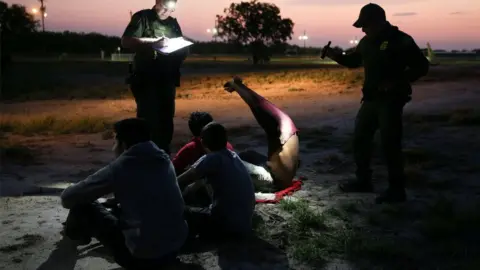 Reuters
ReutersUS Attorney General Jeff Sessions has defended the separation of migrant children from their parents at the border with Mexico, a measure that has faced increasing criticism.
The "zero-tolerance" policy he announced last month sees adults who try to cross the border, many planning to seek asylum, being placed in custody and facing criminal prosecution for illegal entry.
As a result, hundreds of minors are now being housed in detention centres, and kept away from their parents.
What is happening?
Over a recent six-week period, nearly 2,000 children were separated from their parents after illegally crossing the border, figures released on Friday said.
Mr Sessions said those entering the US irregularly would be criminally prosecuted, a change to a long-standing policy of charging most of those crossing for the first time with a misdemeanour offence.
As the adults are being charged with a crime, the children that come with them are being separated and deemed unaccompanied minors.
Advocates of separations point out that hundreds of children are taken from parents who commit crimes in the US on a daily basis.
As such, they are placed in custody of the Department of Health and Human Services and sent to a relative, foster home or a shelter - officials at those places are said to be already running out of space to house them.
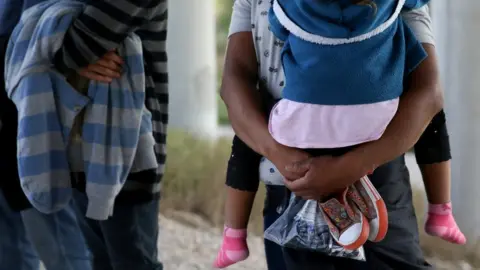 Reuters
ReutersIn recent days, a former Walmart in Texas has been converted into a detention centre for immigrant children.
Officials have also announced plans to erect tent cities to hold hundreds more children in the Texas desert where temperatures regularly reach 40C (105F).
Local lawmaker Jose Rodriguez described the plan as "totally inhumane" and "outrageous", adding: "It should be condemned by anyone who has a moral sense of responsibility."
US Customs and Border Protection (CBP) officials estimate that around 1,500 people are arrested each day for illegally crossing the border.
In the first two weeks of the "zero-tolerance" new approach, 658 minors - including many babies and toddlers - were separated from the adults that came with them, according to the CBP.
The practice, however, was apparently happening way before that, with reports saying more than 700 families had been affected between October and April.
Not only the families crossing irregularly are being targeted, activists who work at the border say, but also those presenting themselves at a port of entry.
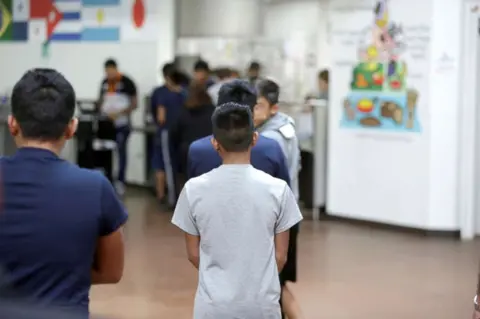 US Government
US Government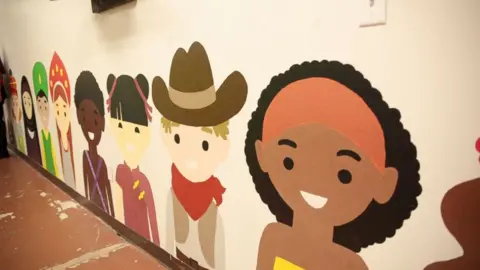 US Government
US Government"This is really extreme, it's nothing like we have seen before," said Michelle Brané, director of Migrant Rights and Justice at the Women's Refugee Commission, a New York-based non-governmental organisation that is helping some of these people.
In many of the cases, the families have already been reunited, after the parent was released from detention. However, there are reports of people being kept apart for weeks and even months.
Family separations had been reported in previous administrations but campaigners say the numbers then were very small.
Whose fault is it?
Mr Trump has blamed Democrats for the policy, saying "we have to break up the families" because of a law that "Democrats gave us".
It is unclear what law he is referring to, but no law has been passed by the US Congress that mandates that migrant families be separated.
Fact-checkers say that the only thing that has changed is the Justice Department's decision to criminally prosecute parents for a first-time border crossing offence. Because their children are not charged with a crime, they are not permitted to be jailed together.
Allow X content?
Under a 1997 court decision known as the Flores settlement, children who come to the US alone are required to be released to their parents, an adult relative, or other caretaker.
If those options are all exhausted, then the government must find the "least restrictive" setting for the child "without unnecessary delay".
The case initially applied to unaccompanied child arrivals, but a 2016 court decision expanded it to include children brought with their parents.
According to the New York Times, the government has three options under the Flores settlement - release whole families together, pass a law to allow for families to be detained together, or break up families.
It is worth noting that Mr Trump's chief of staff John Kelly - who previously served as the head of Homeland Security - said in 2017 that the White House was considering separating families as a means of deterring parents from trying to cross the border.
What do the figures show?
The number of families trying to enter the US overland without documentation is on the rise. For the fourth consecutive month in May, there was an increase in the number of people caught crossing the border irregularly - in comparison with the same month of 2017, the rise was of 160%.
"The trends are clear: this must end," Mr Sessions said last month.
It is not clear, though, if the tougher measures will stop the migrants. Most are fleeing violence and poverty in Central American countries like El Salvador, Guatemala and Honduras and staying, for many, could mean a death sentence.
Human rights groups, campaigners and Democrats have sharply criticised the separations, warning of the long-term trauma on the children. Meanwhile the UN Human Rights Office called on the US to "immediately halt" them.
But Mr Sessions has defended the measure, saying the separations were "not our goal" but it was not always possible to keep parents and children together.
What is the policy in other countries?
No other country has a policy of separating families who intend to seek asylum, activists say.
In the European Union, which faced its worst migrant crisis in decades three years ago, most asylum seekers are held in reception centres while their requests are processed - under the bloc's Dublin Regulation, people must be registered in their first country of arrival.
Measures may vary in different member states but families are mostly kept together.
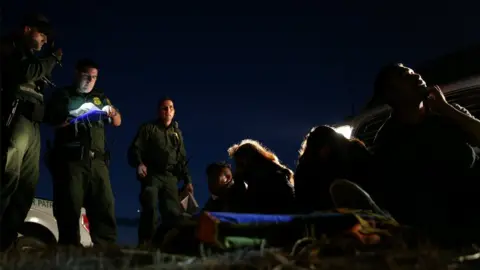 Reuters
ReutersEven in Australia, which has some of the world's most restrictive policies, including the detention of asylum seekers who arrive by boat in controversial offshore centres, there is no policy to separate parents from their children upon arrival.
Meanwhile, Canada has a deal with the US that allows it to deny asylum requests from those going north. It has tried to stem the number of migrants crossing outside border posts after a surge of Haitians and Nigerians coming from its neighbour. However, there were no reports of families being forcibly separated.
"What the US is doing now, there is no equivalent," said Michael Flynn, executive director of the Geneva-based Global Detention Project, a non-profit group focused on the rights of detained immigrants. "There's nothing like this anywhere".
Republicans in the House of Representatives have unveiled legislation to keep families together but it is unlikely to win the support of its own party or the White House.

More on US immigration
